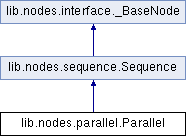|
| def | __attrs_post_init__ (self) |
| | Assigns node's name and id. More...
|
| |
| def | __repr__ (self) |
| |
| def | make_sequence (self, parent_tpl=None) |
| | Builds this sequence execution graph. More...
|
| |
| def | __iter__ (self) |
| |
| def | start_step (self) |
| | Standard sequence's start step. More...
|
| |
| def | end_step (self) |
| | Standard sequence's end step. More...
|
| |
| def | append (self, s) |
| | Appends a node to the Sequence. More...
|
| |
| def | create_node_tasks (self, resume=False) |
| | Creates Task object associated to this node. More...
|
| |
| def | reschedule_node (self, node_id) |
| | Reschedule a node for execution. More...
|
| |
| def | start (self, make_sequence=True, resume=False) |
| | This is the entry point for Sequence execution. More...
|
| |
| def | run (self) |
| | Runs the node – This executes the task. More...
|
| |
| def | execute (self, resume=False, propagate=False) |
| | Executes this just creates the asyncio task. More...
|
| |
| def | resume (self) |
| | Resume node execution. More...
|
| |
| def | main_task (self) |
| | Returns the objective node of the sequence – the end node. More...
|
| |
| def | __call__ (self, resume=False) |
| |
| def | abort (self) |
| | Aborts the sequence. More...
|
| |
| def | nodes (self) |
| | Return nodes from Graph. More...
|
| |
| def | get_node (self, node_id) |
| | Get node by id. More...
|
| |
| def | get_task (self, node_id) |
| | Get task by node_id. More...
|
| |
| def | par (self, k) |
| | Get a parameter value. More...
|
| |
| def | set (self, p) |
| | Sets the value of a parameter. More...
|
| |
| def | make_sequence (self) |
| | does nothing More...
|
| |
| def | make_task (self, node, input_list, resume) |
| | Creates the task object that executes the node. More...
|
| |
| def | pause (self) |
| |
|
| | seq_args = attr.ib(kw_only=True, default=attr.Factory(list), repr=False) |
| |
| | graph = attr.ib(init=False, default=attr.Factory(nx.DiGraph), repr=False) |
| |
| | debug = attr.ib(init=False, default=False, repr=False) |
| |
| | current_seq = cv.ContextVar("current_seq", default=None) |
| |
| | root = cv.ContextVar("root", default=None) |
| |
| | id = attr.ib(default=None, kw_only=True) |
| |
| | name = attr.ib(default=None, kw_only=True) |
| |
| | runtime_flags = attr.ib(default=0, kw_only=True) |
| |
| | deps = attr.ib(default=attr.Factory(list), repr=False, kw_only=True, init=False) |
| |
| | description = attr.ib(default="", kw_only=True) |
| |
| | exception = attr.ib(init=False, default=None, repr=False) |
| |
| | can_skip = attr.ib(default=True, init=False) |
| |
| | hide = attr.ib(default=False, init=False) |
| |
| | t_start = attr.ib(init=False, default=None, repr=False) |
| |
| | t_end = attr.ib(init=False, default=None, repr=False) |
| |
| | running_checkpoint |
| |
| | serial_number = attr.ib(init=False) |
| |
Parallel node definition.
Use the :meth:create method to build properly :class:Parallel nodes. Since it inherits from :class:Sequence it has access to the same context variables.
Examples
One can access the running Sequence using Sequence.current_seq context variable.
>>> s = Parallel.create(a,b, name="my sequence")
>>> await s.start()
... current_seq = Sequence.current_seq
...
... assert current_seq == s
def a()
Simply do_a.
Definition: a.py:17

 Public Member Functions inherited from lib.nodes.sequence.Sequence
Public Member Functions inherited from lib.nodes.sequence.Sequence Public Member Functions inherited from lib.nodes.interface._BaseNode
Public Member Functions inherited from lib.nodes.interface._BaseNode Static Public Member Functions inherited from lib.nodes.sequence.Sequence
Static Public Member Functions inherited from lib.nodes.sequence.Sequence Public Attributes inherited from lib.nodes.sequence.Sequence
Public Attributes inherited from lib.nodes.sequence.Sequence Static Public Attributes inherited from lib.nodes.sequence.Sequence
Static Public Attributes inherited from lib.nodes.sequence.Sequence Static Public Attributes inherited from lib.nodes.interface._BaseNode
Static Public Attributes inherited from lib.nodes.interface._BaseNode Properties inherited from lib.nodes.sequence.Sequence
Properties inherited from lib.nodes.sequence.Sequence Properties inherited from lib.nodes.interface._BaseNode
Properties inherited from lib.nodes.interface._BaseNode